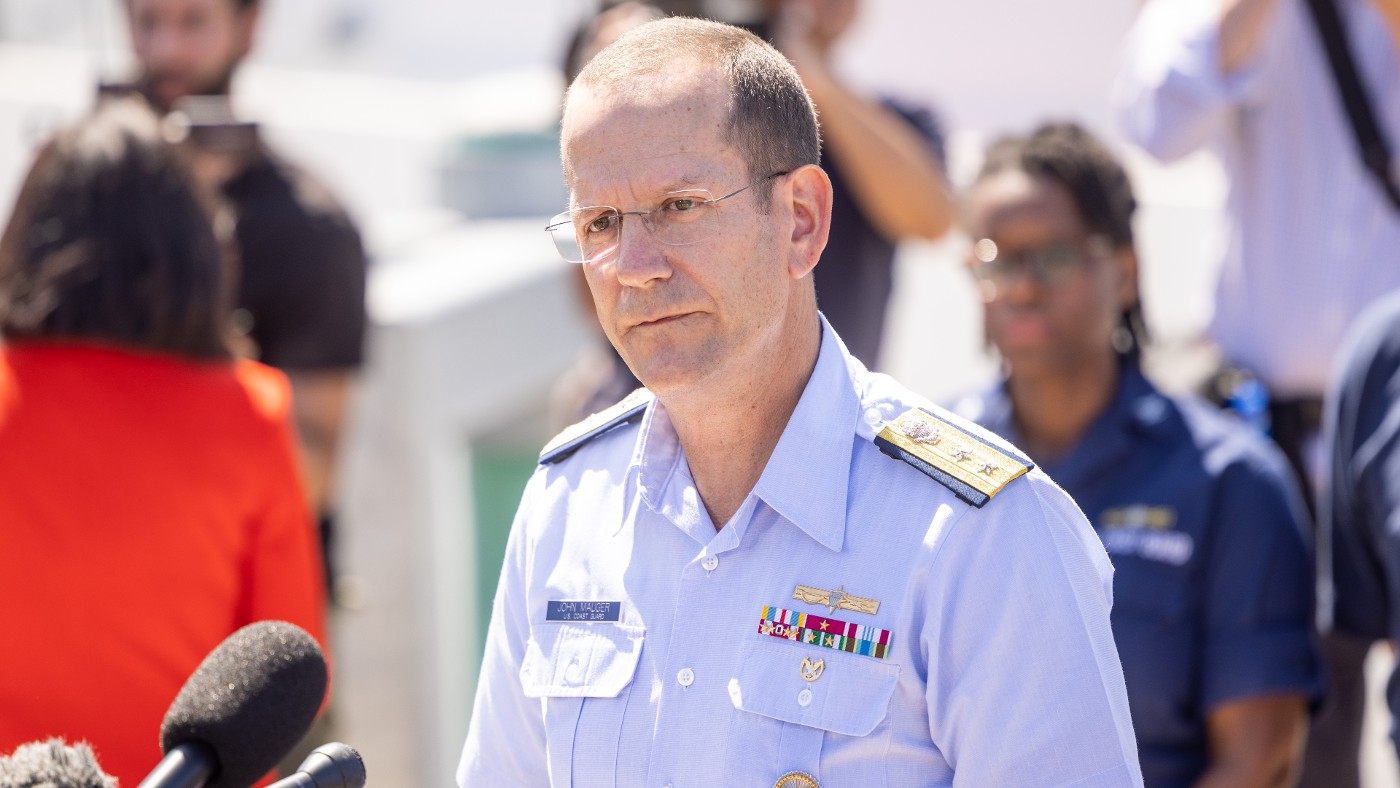Five Eyes: the spy scandal spooking Western powers
Top Canadian intelligence official accused of stealing classified data

A free daily email with the biggest news stories of the day – and the best features from TheWeek.com
You are now subscribed
Your newsletter sign-up was successful
The Government of Canada is attempting to reassure its allies after one of the country’s top intelligence officials was arrested for allegedly violating national security laws.
On Friday, the Royal Canadian Mounted Police (RCMP) charged Cameron Ortis – head of the police force’s own intelligence unit – with leaking or offering to share covert data. After concerns were raised about the content of this information, the RCMP admitted Ortis had “access to intelligence originating from our partners both domestically and internationally”.
The row poses a major threat to Canada’s standing among the so-called Five Eyes, an intelligence-sharing network set up in the wake of the Second World War that also includes the US, Australia, New Zealand and the UK. The RCMP has suggested the other Five Eyes members may decide they can no longer trust Canada, prompting Canada’s Prime Minister Justin Trudeau to announced this week that Ottawa is in “direct communications with our allies” to assess the potential damage, reports Reuters.
The Week
Escape your echo chamber. Get the facts behind the news, plus analysis from multiple perspectives.

Sign up for The Week's Free Newsletters
From our morning news briefing to a weekly Good News Newsletter, get the best of The Week delivered directly to your inbox.
From our morning news briefing to a weekly Good News Newsletter, get the best of The Week delivered directly to your inbox.
“We are also working with them to reassure them, but we want to ensure that everyone understands that we are taking this situation very seriously,” Trudeau said during an election campaign stop in Newfoundland.
But his words have done little to quell widespread fears over the alleged leak. Stephanie Carvin, a professor at Ottawa’s Carleton University and former government national security analyst, described the reported breach as “potentially the worst” in Canadian intelligence history, says The Times.
What is the Five Eyes?
Building on a successful intelligence network constructed during WWII, the UK and US created the UKUSA Agreement in 1946, in which they vowed to share vital information pertaining to the Soviet Union during the Cold War. Canada joined in 1948, followed by Australia and New Zealand in 1956, leading to the organisation’s Five Eyes nickname.
A free daily email with the biggest news stories of the day – and the best features from TheWeek.com
CNN says that although there are other multilateral intelligence-sharing arrangements, “such as within Nato”, the Five Eyes is different because “more information gets shared” owing to a “common language and decades of trust”.
The organisation is also notorious for its selective treatment of outsiders, only sharing information with others on a case-by-case basis.
US whistle-blower Edward Snowden has described the Five Eyes as a “supra-national intelligence organisation that does not answer to the known laws of its own countries”. In 2013, Snowden leaked documents that alleged members of the alliance “have been spying on one another’s citizens and sharing the collected information with each other” in order to “circumvent restrictive domestic regulations on surveillance of citizens”.
Who is Cameron Ortis?
The 47-year-old head of the RCMP’s National Intelligence Coordination Centre graduated from the University of British Columbia with a doctorate in political science before becoming an adviser for the Canadian federal government in 2007. He is a proficient Mandarin speaker.
Canadian newspaper The Globe and Mail reports that his work in the RCMP “gave him broad access to both Canadian and allied intelligence”, adding that “as recently as last month, he was working on a probe of defrauded Russian tax money being laundered through Canada”.
Sources familiar with his professional role said Otis would have had knowledge of code words and operations.
Friends and colleagues told the newspaper that he “offered up few details about what he was working on, and with whom”.
Why has he been arrested?
The arrest last week follows a secretive in-depth inquiry that started last year, according to reports. Ortis is accused of communicating operational information in 2015 and of gathering intelligence last year to share with a foreign entity or terrorist group. He faces seven charges under the Security of Information Act and the criminal code.
The charges filed against him include the “unauthorised communication of special operational information”, possessing a device or software “useful for concealing the content of information or for surreptitiously communicating, obtaining or retaining information”, and breach of trust by a public officer.
According to Canadian federal prosecutors, Ortis “obtained, stored [and] processed sensitive information, we believe with the intent to communicate it to people he shouldn’t be communicating it to”.
It is not currently known who those people might be, but state-run broadcaster CBC News claims to have seen documents that tie Ortis to Vincent Ramos, the former CEO of a Vancouver company that sold modified Blackberry devices to organised crime rings including the infamous Sinaloa drug cartel.
US police arrested Ramos, a Canadian citizen, last year and charged him with conspiring to distribute narcotics and racketeering. After pleading guilty in October, he was sentenced to nine years in prison.
CBC News alleges that leaked papers from the FBI and Canada’s Communications Security Establishment say that “a person was sending emails” to Ramos “offering to provide valuable information”.
“The documents allege that person was Ortis,” says the broadcaster.
One message quoted in the files reportedly said: “You don’t know me. I have information that I am confident you will find very valuable.”
Why are allies worried?
According to The Guardian, the breach has “sent tremors through the Five Eyes”, with the other members “concerned that their own secretive intelligence-gathering methods might also be compromised”.
On Tuesday, Canadian leader Trudeau stated that he wanted to “ensure that everyone understands that we are taking this situation very seriously”, but refused to offer further details.
But RCMP Commissioner Brenda Lucki admitted there was “always the possibility” that partner agencies might lose trust in Canada’s security apparatus.
“I would definitely imagine that there is concern amongst our Five Eyes community as well as within Canada,” she said.
However, a former intelligence analyst for the Australian government told The Guardian that the Five Eyes alliance was not under threat.
“While it’s very serious, and countries will be concerned, I don’t think it’s going to undermine the Five Eyes arrangements,” said Daniel Flitton, of the Lowy Institute think tank. “Ultimately, what this reflects is that the weakest part of any security system is the people that you let have access.”
-
 What to know before filing your own taxes for the first time
What to know before filing your own taxes for the first timethe explainer Tackle this financial milestone with confidence
-
 The biggest box office flops of the 21st century
The biggest box office flops of the 21st centuryin depth Unnecessary remakes and turgid, expensive CGI-fests highlight this list of these most notorious box-office losers
-
 The 10 most infamous abductions in modern history
The 10 most infamous abductions in modern historyin depth The taking of Savannah Guthrie’s mother, Nancy, is the latest in a long string of high-profile kidnappings
-
 'Angel' visits woman before lottery win
'Angel' visits woman before lottery winTall Tales And other stories from the stranger side of life
-
 Doomsday group offers 'epic' survival opportunity
Doomsday group offers 'epic' survival opportunityTall Tales And other stories from the stranger side of life
-
 What we know about the Titan sub’s likely implosion
What we know about the Titan sub’s likely implosionfeature Experts say the five passengers would have died ‘instantaneously’ following ‘catastrophic’ loss of pressure
-
 What happened to the missing Titanic sub?
What happened to the missing Titanic sub?Today's Big Question Oxygen supplies running out after vessel lost contact during ‘daredevil’ trip
-
 Man arrested after shooting himself in the leg
Man arrested after shooting himself in the legfeature And other stories from the stranger side of life
-
 Scientists have watched the end of the world
Scientists have watched the end of the worldfeature And other stories from the stranger side of life
-
 Canada’s troubled relationship with its indigenous population
Canada’s troubled relationship with its indigenous populationfeature State grappling with reparations amid accusations of genocides against First Nations people
-
 Woman passes driving test at 960th attempt
Woman passes driving test at 960th attemptfeature And other stories from the stranger side of life